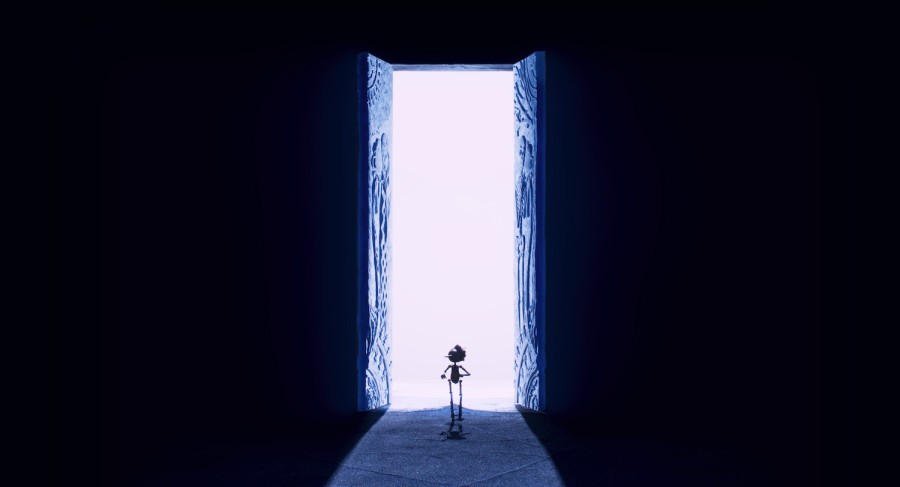Review: Stop-motion animation in ‘Guillermo del Toro’s Pinocchio’ emotionally captures life’s transience
Guillermo del Toro and Mark Gustafson’s adaptation of the classic fairytale reaffirms why animation matters with a profound, heartful and incredibly moving narrative. The film is now playing at the IFC Center and available to stream on Netflix.
Guillermo del Toro’s Pinocchio – (Pictured) Pinocchio (voiced by Gregory Mann). (Courtesy of Netflix © 2022)
December 12, 2022
“Guillermo del Toro’s Pinocchio” is one of the most prolific animated films since 2014’s “The Lego Movie.” Directors Mark Gustafson — who is best known for his work as animation director on “Fantastic Mr. Fox” (2009) — and Guillermo del Toro have created what is not only the best adaptation of the fairytale, but also a profoundly delicate, personal, existential and endlessly creative work of art.
Set during the rise of fascism in Mussolini’s Italy, “Pinocchio” begins with grief-stricken carpenter Geppetto (David Bradley), who is coping with the death of his son Carlo, who died in a church bombing. Filled with despair, Geppetto cuts down a tree on a brilliantly atmospheric, thunderous night, and attempts to replace his lost child with a hand-crafted puppet, Pinocchio (Gregory Mann). Immediately and effectively, Del Toro and Gustafson establish a personal account of parental grief and inherent loss which separates their work from any other rendition of the classic tale.
The tactile, heavily textured and meticulously constructed stop-motion animation gives “Pinocchio” a freshly authentic and ragged undertone to its whimsically magical nature. Pinocchio is brought to life by the Wood Sprite (Tilda Swinton), whose contingency, Sebastian J. Cricket (Ewan McGregor) promises to make Pinocchio a real boy in exchange for one wish. While McGregor also offers voice-over narration throughout the film, his character counsels Pinocchio throughout his journey, teaching him about morals and human complexities. Cricket describes Carlo’s death as being a burden for Geppetto, prompting Pinocchio to try his best to be exactly like Carlo for his father’s sake.
Del Toro’s film is about Geppetto as much as it is about Pinocchio. Geppetto, in his drunken despair, is initially hellbent on merely replacing Carlo with Pinocchio, as if an entirely new creation can fill the hole left after his son’s death. His grief is unwilling to accept death to the point where he wants nothing but for Pinocchio to act exactly like Carlo. Pinocchio challenges the false notion that obedience gives life purpose — that subjugation is the cornerstone of life’s meaning. He doesn’t want to be someone he’s not. Geppetto, by the end, understands this. He learns to accept death and his new son’s individuality. In the same vein, Pinocchio learns to find purpose in loving and being loved.
Pinocchio ponders life, questioning why people like a wooden crucifix of Jesus but are afraid of a living puppet. He wants to be a “real boy” — drinking hot chocolate, warming himself by a fire and, most of all, earning the love and approval of his father, even if it means trying to be somebody he is not.
Through a series of quite horrific accidents, Pinocchio learns that he cannot die, a revelation that reinforces the meaning of his goal in life, and questions what it is that really gives life meaning if it is transient. This question of individuality is explored not just personally, but also politically.
Del Toro fearlessly addresses themes and questions that other renditions of the tale are frankly too afraid to even touch upon. Once the innocent, naive Pinocchio reveals himself to his local town, the podestá (Ron Perlman), a high official for Mussolini’s regime, views the wooden boy as an indestructible soldier who could serve as an asset in war. This is explored further when the podestá’s son, Candlewick (Finn Wolfhard), is also desperately seeking approval from his father. The parallel between Candlewick and Pinocchio is as endearing as it is heartbreaking, and is one of the many examples of Del Toro’s masterful ingenuity and strikingly poignant storytelling.
“Guillermo del Toro’s Pinocchio” isn’t just a staggering artistic achievement, but also a thoughtful, genuine snapshot of life, death and purpose. The misadventures of Pinocchio go beyond mere spectacle and sincerely question humanity’s value and the importance of balancing independence and love. Del Toro’s newest masterpiece is undoubtedly one of the best films of the year.
Contact Yezen Saadah at [email protected].

























































































































































